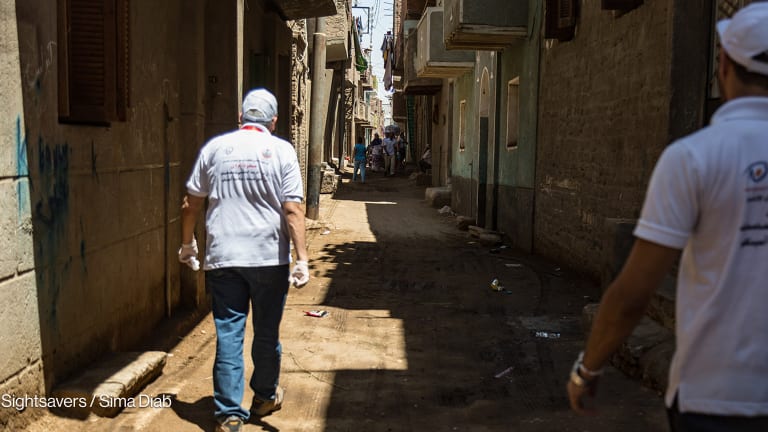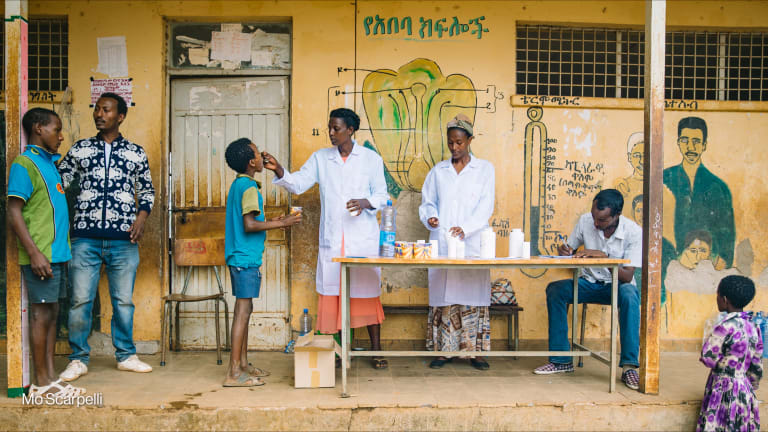
Niger has become the first country in Africa to be recognized by the World Health Organization for interrupting the transmission of onchocerciasis, or river blindness. The milestone marks a significant step in the global effort to eliminate the disease, which affects millions across the continent.
Onchocerciasis is a parasitic eye and skin disease transmitted to humans through the bite of infected blackflies, which breed in rapidly flowing rivers and streams in tropical regions, often near fertile land used for agriculture.
As of 2023, WHO estimates that nearly 250 million people required preventive treatment against onchocerciasis, which can cause visual impairments, permanent blindness, disfiguring skin conditions, and severe itchiness — limiting people’s ability to work, study, and perform daily activities.
As the second-leading infectious cause of blindness worldwide after trachoma, onchocerciasis primarily impacts communities in rural areas, with 99% of infected people living in sub-Saharan Africa and Yemen and the remaining 1% living on the border between Brazil and Venezuela.
Research suggests this geographic distribution is down to the ecology and behavior of the blackflies, which prefer well-oxygenated, nutrient-rich water. The flies’ limited flight range also results in a higher number of cases among communities that farm along fertile rivers.
Interrupting transmission
Niger’s successful elimination of onchocerciasis means it now joins Colombia, Ecuador, Guatemala, and Mexico, becoming the fifth country in the world to do so. With onchocerciasis being one of the diseases targeted for elimination in WHO’s 2030 road map on neglected tropical diseases, or NTDs, it brings the NTD community one step closer to the goal of recognizing 12 countries for the interruption of onchocerciasis transmission.
Several other endemic countries — including Senegal, Equatorial Guinea, Uganda, and Venezuela — have stopped mass drug administration, or MDA, and moved to post-treatment surveillance of at least 50% of their population. This marks a significant step for countries that have implemented years of effective MDA programs and frees up resources for other national health priorities.
As these countries will now have their sights set on successfully interrupting transmission, Niger’s news “offers hope to other nations still battling onchocerciasis, demonstrating that elimination is possible,” WHO Director-General Dr. Tedros Adhanom Ghebreyesus said in a recent statement.
The announcement is the result of nearly 50 years of collaboration between Nigerien government departments, WHO, and nongovernmental organizations, as well as support from Reaching the Last Mile Fund, a $500 million multidonor fund aimed at eliminating lymphatic filariasis and onchocerciasis in 39 countries.
The road to elimination
Recognizing that onchocerciasis was a major public health issue, Niger began spraying a rotation of insecticides across blackfly breeding sites between 1976 and 1989 to decrease transmission rates as part of the WHO Onchocerciasis Control Programme in West Africa.
The elimination strategy proved effective, with ongoing surveillance between 2002 and 2015 confirming low disease rates. Between 2008 and 2019, ivermectin — donated by MSD, known as Merck in the U.S. and Canada, through its Mectizan Donation Program — was then issued as part of mass drug administration programs.
Opinion: Why 2025 is a tipping point for NTDs
Isatou Touray, executive director of Uniting to Combat NTDs, urges accelerated action against NTDs, stressing the need for collaboration, funding, and strong political commitment to meet WHO’s 2030 goals.
While targeted at treating lymphatic filariasis, which is co-endemic across several countries — including Ethiopia and Senegal— ivermectin is also effective at managing symptoms and reducing transmission of onchocerciasis, and further interrupted transmission of the disease in Niger’s last remaining pockets.
While representing a significant milestone for the whole of Africa, the announcement perhaps has the biggest impact on the millions of people who lived and worked along the rivers and had to leave their lives and livelihoods behind when onchocerciasis reached endemic levels.
These benefits extend to the country’s economy, too. In 2012 alone, Niger spent $2.7 million — 1.2% of the government’s total health spending — on onchocerciasis control efforts, despite disease prevalence rates dropping to nearly zero. Eliminating onchocerciasis not only means avoiding this cost altogether; it also creates an estimated $2.3 billion in economic benefits, adds 17.8 billion working hours and contributes $682 million to GDP as infected people return to work.
“Onchocerciasis has long caused immense human suffering. It has also impeded the economic development of affected communities, driving people away from rivers, which are often lifelines for livelihoods,” Dr. Matshidiso Moeti, who recently concluded her tenure as WHO regional director for Africa, said in a statement. “Niger’s success ends this burden for its people. It also positions Niger as a model for the elimination of neglected tropical diseases in Africa. The country previously demonstrated its leadership in public health, by eliminating Guinea-worm disease in 2013. Today, it takes another historic step forward.”
Visit Escape the Neglect — a series exploring the extraordinary progress that countries are making in eliminating neglected tropical diseases, or NTDs, and showcasing promising opportunities to build on recent wins.
This content is part of our Escape the Neglect series. Click here to learn more.









